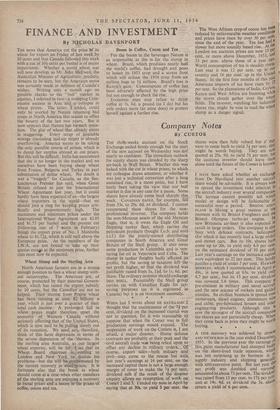FINANCE AND INVESTMENT
By NICHOLAS DAVENPORT
THE news that America cut the price ttf its wheat for export on Friday of last week .by 10 cents and that Canada followed this week with a cut of 101 cents per bushel is of major importance. Whether a world wheat war will now develop, as Mr. John McEwen, the Australian Minister of Agriculture, predicts, remains to be seen, but the American move was certainly made in defiance of Canada's wishes. Writing only a month ago on possible checks to the "bull" market in equities, I referred to two—a sweeping Com- munist success in Asia and a collapse in wheat prices. The latter, I added, could only be averted by Nature returning bad crops in North America this season to offset the bounty of the last two years. But it now appears that Nature has no such inten- tion. The glut of wheat that already exists is staggering. Every scrap of available storage (including laid-up ships) is already overflowing. America seems to be taking the only possible course of action, which is to dump her surplus abroad at cut prices. But this will be difficult. India has announced that she is no longer in the market and we ourselves have been buying cheap wheat from France, Bulgaria and Turkey in part substitution of dollar wheat. No doubt it was a "tragedy" for Canada, as the Sas- katchewan Premier has said, when Great Britain refused to join the International Wheat Agreement last year, but it could hardly have been expected of us—the largest wheat importers in the world—that we should join a ring for keeping prices arti- ficially and preposterously high. The maximum and minimum prices under the International Wheat Agreement are $2.05 and $1.55 per bushel and the present cut (following one of 7 vents in February) brings the export price of No. 1 Manitoba wheat to $1.72i, which is still well above the European price. As the members of the I.W.A. are not bound to take up their quotas exceit at the minimum price, further cuts must now be expected.
Wheat Slump ana the Sterling Area North American farmers are in a strong enough position to face a wheat slump with- out catastrophe. The American are, of course, protected by their paternal Govern- ment, which has raised the export subsidy by 10 cents, but the Canadian are not so helped. Their income from Prairie wheat has been running at over $2 billions a year, which is just over a quarter of their total cash income. A prolonged fall in wheat prices might therefore upset the economy of Western Canada without seriously affecting that of the United States, which is now said to be pull* slowly out of its recession. We need not, therefore, think of this farm depression in terms of the severe depression of the 'thirties. In the sterling area Australia, as our largest wheat exporter, will be hit—I see that its Wheat Board chairman is coming to London and New York to discuss his problems—but she will be compensated by the current recovery in wool prices. It is fortunate also that the break in wheat should come ate time when other members of the sterling area are enjoying a recovery in metal prices and a boom in the prices of coffee, cocoa and tea. Boom in Coffee, Cocoa and Tea For the boom in the beverages Nature is as responsible as she is for the slump in wheat. Brazil, which produces nearly half the world's coffee, had drought and pests ' to lessen its 1953 crop and a severe frost which will reduce the 1954 crop from six million bags to 1 million. Brazil's loss is Kenya's gain. Consumption of coffee has been adversely affected by the high price but not enough to check the rise.
Economic man may refuse to drink coffee at 7s. 6d, a pound (as I do) but his wife orders more (as mine does) to protect herself against a further rise. The West African crop of cocoa has been reduced by unfavourable weather conditiolle and prices have risen by over 30 per cern' since the end of the year. Tea has had slower but more soundly based rise. At tin London tea auctions prices are now 15 Peri cent, or more above December, 1953, an° 33 per cent, above those of a year al30i World consumption of tea is steadily rising. Last year it was 12 per cent. up in our country and 16 per cent up in the United States. In the first four months of this Year., American imports of tea have risen by 21 per cent. So the plantations of India, Ceylon, Kenya and West Africa are booming whin the storm clouds gather over the wheal fields. The investor, watching his industrial shares rise, might be wise to read.the wheal slump as a danger signal.


































 Previous page
Previous page